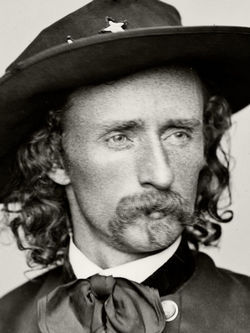
Cause of death: death in action
George Armstrong Custer (December 5, 1839 – June 25, 1876) was a United States Army officer and cavalry commander in the American Civil War and the American Indian Wars.
Custer graduated from West Point and, having been last in his graduating class, actually finished 34th out of a starting class of 108 candidates, yet achieved a higher military rank than any other officer in his class. Following graduation, he worked closely with General George B. McClellan and the future General Alfred Pleasonton, both of whom recognized his ability as a cavalry leader. He was promoted to brigadier general of volunteers aged 23. Only a few days afterwards, he fought at the Battle of Gettysburg, where he commanded the Michigan Brigade. Despite being outnumbered, Custer defeated J. E. B. Stuart's attack at East Cavalry Field.
In 1864, he served in the Overland Campaign and Philip Sheridan's army in the Shenandoah Valley, defeating Jubal Early at Cedar Creek. In 1865, he destroyed or captured the remainder of Early's forces at the Battle of Waynesboro. His division blocked the Army of Northern Virginia's final retreat and received the first flag of truce from the Confederates. He was present at Robert E. Lee's surrender to Ulysses S. Grant at Appomattox Court House, Virginia. After the war, Custer was commissioned as a lieutenant colonel in the Regular Army and sent west to fight in the Indian Wars, mainly against the Lakota and other Plains Peoples. On June 25, 1876, while leading the 7th Cavalry Regiment at the Battle of the Little Bighorn in Montana Territory against a coalition of Native American tribes, he was killed along with every soldier of the five companies he led. This event became known as "Custer's Last Stand".
His dramatic end was as controversial as the rest of his career, and the reaction to his life remains divided. His mythologized status in American history was partly established through the energetic lobbying of his wife Elizabeth Bacon "Libbie" Custer throughout her long widowhood which spanned six decades.
Source : Wikipedia